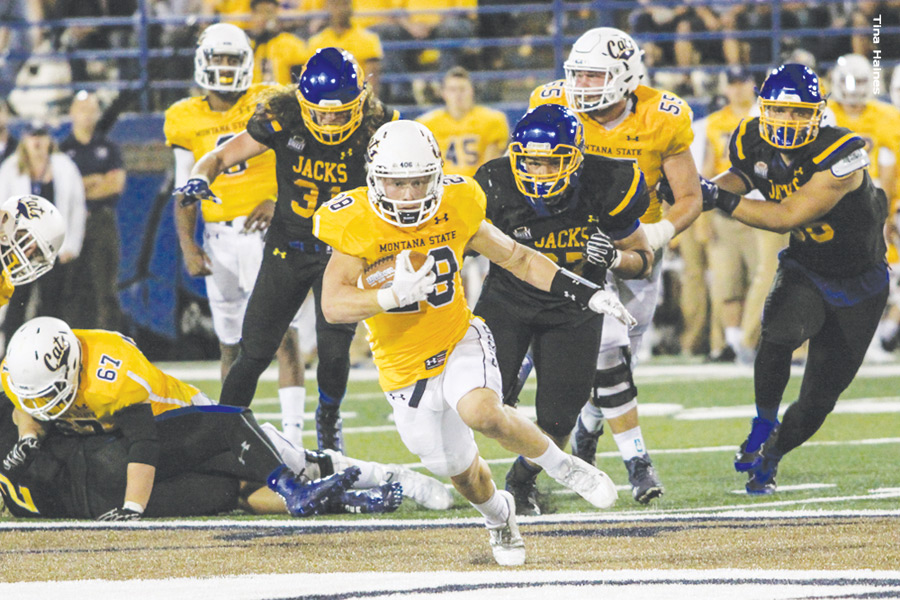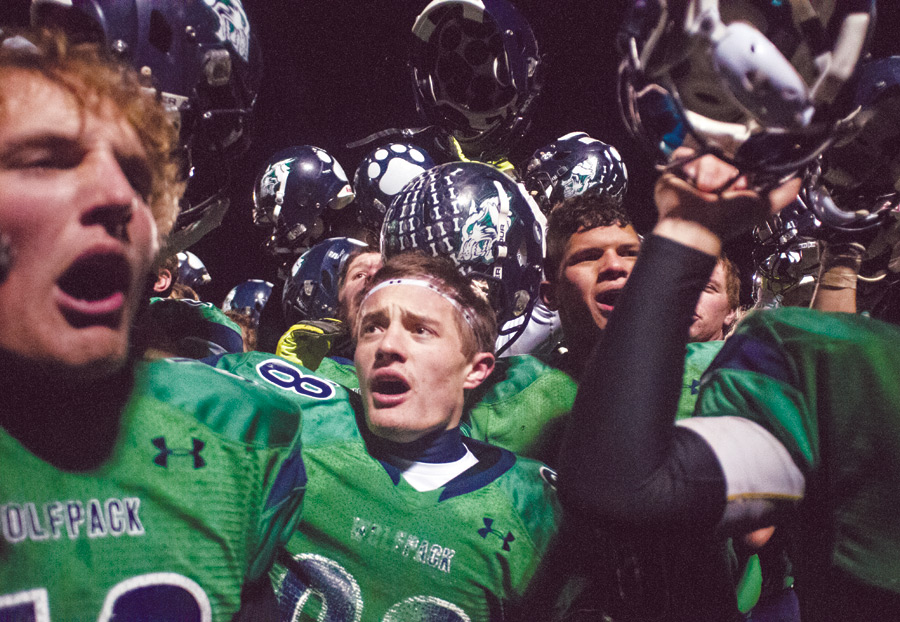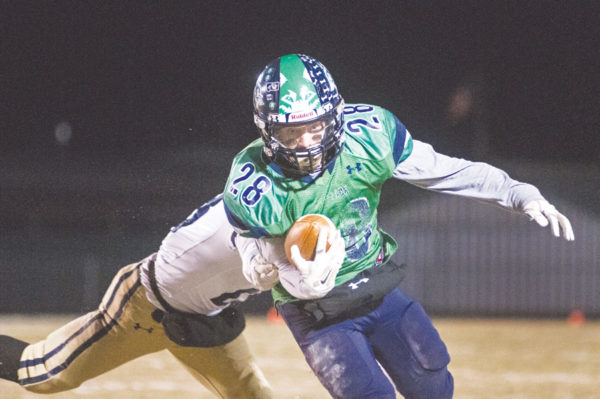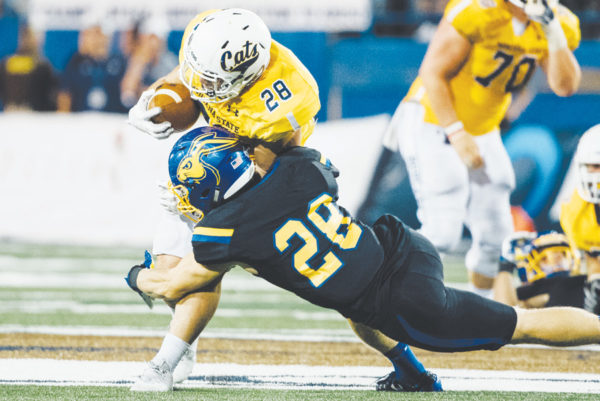The Complicated Legacy of Logan Jones
Seven years after taking part in a hazing incident that rocked Glacier High School’s football program, Logan Jones is preparing for his final act on the gridiron
By Andy Viano
Over here is Logan Jones, celebrating Glacier High School’s first state football championship, screaming in ecstasy and surrounded by his loving teammates.
And over there is also Logan Jones, sitting in a courtroom, apologizing to his victims and hearing his punishment after admitting to his role in a highly publicized hazing incident.
Here, too, is Logan Jones, clad in Montana State University’s snappy all-white road uniform, diving headlong into the end zone for a touchdown against North Dakota in front of thousands of in-stadium fans and a rapt television audience.
And there again is Logan Jones, age 15, allegedly pulling his classmates into the back of a school bus and physically harassing them on their way home from a football game in Missoula, covering their mouths so they could not call for help.
Then there is Logan Jones burying his mother, and later his grandmother. There is Logan Jones feeling the taunts and threats that came from inside his own community, harnessing his immaturity and energy into an incomparable weapon on the football field.
And here, today, is still Logan Jones, defiant as ever, and readying himself for one last chapter in a tumultuous football life.

Grady Bennett pauses and takes a deep, measured breath.
“I’m sorry, but I’ve been thinking about this for (seven) years,” he says.
Bennett is Glacier High School’s football coach, the only one the school has ever known. He is a man with tremendous football acumen who has built the Wolfpack into one of the best programs in the state, but one who is quick to dwell on his passion for developing young men in his classroom more than on developing great athletes. Once a standout quarterback himself at Flathead High School, Bennett starred at the University of Montana before coming back to coach football in his hometown, first at Flathead and later at Glacier when the school opened in 2007.
But after Activities Director Mark Dennehy called the football coach into his office in September 2011 to explain that what Bennett at first thought was “boys being boys” had turned into something much more sinister-sounding, the coach thought he might be on the verge of losing his job.
The details of what happened on a bus carrying Glacier’s freshman football team from Missoula to Kalispell after a game on Sept. 12, 2011 remain a matter of dispute, but what is not up for debate is that at some point during the two-hour drive north several members of the team grabbed four classmates, brought them to the back of the bus and hazed them. There was physical contact and an effort made to conceal their actions from the adults riding on the same bus. And when the bus pulled back into Kalispell, the victims reported what had happened.
Then the story exploded.
Police began investigating, and newspapers and other media from around the state caught on, with reports alleging that boys were dragged to the back of the bus where Jones’ attack included punching the victims in the groin and, in one case, that Jones attempted to insert his finger into a boy’s anus through his clothes. A Kalispell police officer recommended that Jones be charged with sexual assault, but prosecutors opted only to file misdemeanor assault charges in Youth Court, where Jones admitted wrongdoing and was given six months probation, ordered to undergo counseling and made to write letters to the victims, among other stipulations. He was kicked off the football team immediately after the incident and expelled from school for the remainder of that quarter.

Parents of some of the victims would later file a legal petition to try to prevent Jones from returning to school and interacting with victims. At least one victim transferred out of the school as a result of the hazing, which some victims’ parents described as a sexual attack. In March 2012, the parents of one victim sued Jones and three other boys, along with district administrators and coaches, alleging negligence on the part of the school and seeking punitive damages for emotional distress. Two other boys were also charged with misdemeanor assault as part of the hazing.
Seven years later, Jones and Bennett spoke candidly about the months that began with the hazing and ended with Jones’ sentencing in January 2012. While Bennett acknowledged that Jones was a hyperactive, immature student as a freshman, and someone who had to be reigned in and stop “being a dingbat,” he believes the hazing and its aftermath were badly misrepresented in media reports and legal filings. Bennett, the team’s varsity coach, was not on the bus when the hazing occurred. Jones, for his part, has stayed out of legal trouble since the incident and is on track to earn a college degree next year.
“Was it wrong? Yes. Should they have been disciplined? Totally yes,” Bennett said. “On the flip side, it was totally over-sensationalized and blown to a proportion that was way beyond what it was.”
“It was just a bunch of ridiculous dog-piling,” Jones said. “There were no verbal threats; there was nobody screaming … I’ve never seen something so ridiculous. The day I got pulled into the office my mind was blown … There were a lot of false things said.”
Both Jones and Bennett say the player was welcomed back to the football program with open arms after serving his punishment, which Bennett said helped signal to him that perhaps the hazing was less traumatic than had been alleged, but not everyone in the community was happy to see Jones and other boys who were also kicked off the team as freshmen back on the field.
“The people that wanted to crucify these boys and kick them to the curb, that’s one of the things that I struggle with,” Bennett said. “There are things that are punishable … but what I kept arguing, especially with (those) people, is what is the point of education? It’s not about second chances; kids are always going to make mistakes. It’s taking those things and teaching. That’s where we were trying to make the judgment and say, ‘You know what, you (Jones) made a mistake. Let’s learn from it, let’s be better.’”
“What I learned from it was to put your nose down, not listen to what anyone else says,” Jones said. You’re the only one there for yourself; life’s hard so you’ve got to keep fighting through. I think I learned that at a pretty young age.”
When Jones and his teammates returned to the high school football field, they were electrifying. The Wolfpack reached the state championship game Jones’ junior year, and then the next year put together arguably the greatest season in Montana football history, winning the 2014 Class AA state championship — the first and only title for the school — and outscoring their opponents 645-164 along the way. They won 56-19 in a lopsided championship game, and most of the games they played that year were over by halftime.
Jones was right in the middle of all of it, the 5-foot-9 dynamo averaging nearly eight yards per carry on the ground and scoring 23 total touchdowns: 14 receiving, four rushing, four on punt returns and another on a kick return. His first step and acceleration were and are nearly unmatched, and he is bull strong despite his small stature.

“I felt bad for Logan because we beat everybody so bad he didn’t get the touches he deserved,” Bennett said. “His stats were already ridiculous, but he could have doubled that if we would have actually had to give him the ball. There were times when I would tell (Glacier quarterback) Brady (McChesney) not to throw to him because he would probably score.”
Bennett believes that Jones and classmates used the hazing incident and fallout as fuel to motivate them, and that they learned a lesson in overcoming adversity.
“I think they developed a chip on their shoulder because of the things that came out,” Bennett said. “Those kids developed such a ‘we are going to come together and show everybody’ (attitude), and it was amazing. I feel so satisfied with the lessons that they did learn about all of that … It was what education is all about. I think all of these boys are going to be successful because they’ve learned something that many people never will get a chance to.”
After high school, Jones turned down scholarships with smaller programs to enroll at MSU as a preferred walk-on. Without even knowing what position he would play — either running back or wide receiver — Jones made an immediate impact on special teams, returning a kickoff 100 yards for a touchdown as a freshman against Portland State. By the start of his junior year, Jones was listed as the Bobcats’ starting running back, but as fall camp got underway last week an adductor injury has the senior sidelined for the indefinite future, although Jones is hopeful he will be back during the early part of Montana State’s schedule.
When the season does kick off, the Bobcats will have heightened expectations under third-year coach Jeff Choate, and the confident Jones is outspoken about his team’s capabilities.
“You’re damn right I expect us to get in the (NCAA Football Championship Subdivision) playoffs,” he said. “After putting in all that work over all these years, you’ve got to think that — you’ve got to have that mentality.”
Jones expects to graduate in the spring with a construction engineering and technology degree, and said he would like to someday return to Kalispell and begin his adult life in his hometown. His father, Robert, is here, and the two are extremely close, especially since Robert’s mother and Logan’s grandmother, Helen, died when Logan was in high school. She, like Robert, was a staple at every one of Logan’s games.
“I remember going out junior year and it was really hard not seeing her there,” Logan said. “It’s hard to miss her but she’s up there watching, so I better make her proud.”
And there’s another Glacier fan who will be watching with pride when Jones returns to the field this fall. Bennett, the head coach who feared for his job over Jones’ actions and who still gets emotional talking about the most challenging episode of his high school career — one that nearly fractured his program and his community, and required him to comfort, teach and inspire players who had been both victims and attackers — is absolutely proud every time Jones puts on his Bobcats uniform.
“When I see where he’s at, what he’s doing, I get chills,” Bennett said. “That’s why I’m in education. That’s why I do what I do. It’s success stories like that. That whole group, all those kids, there was a lot of hurt and a lot of pain, but to see what they did and now what they’ve done, I’m very, very proud, and proud of the process of education in restoring kids.”
Jones looks back on the hazing as a youthful indiscretion, and the aftermath as a life lesson he has fully absorbed.
“There was nothing I could do, I just took the punches,” he said. “I came back to school the next year, came to college, have a beautiful degree coming my way, the best friends I’ll have for the rest of my life. I think that everything that’s happened to me has made me the person I am today.”